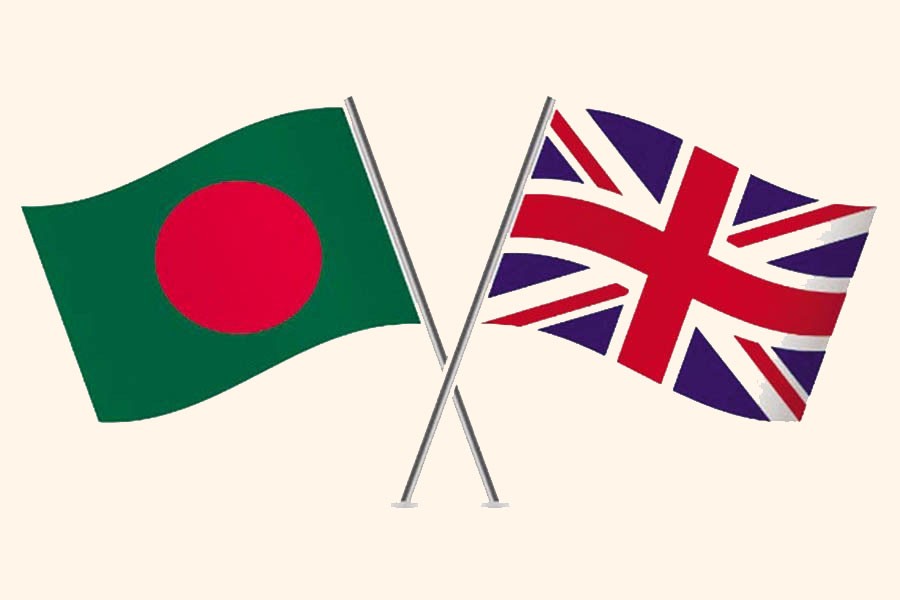
Published :
Updated :

The UK government has launched a new scheme that aims to drive trade with Bangladesh and other countries boosting jobs and growth.
The new trading rules will help countries come out of poverty and help British businesses and consumers at the same time, said the UK government.
The UK Developing Countries Trading Scheme (DCTS) is a major opportunity to grow free and fair trade with developing nations, reports UNB.
Javed Patel, acting British High Commissioner in Dhaka, said the proposed DCTS scheme signals the UK’s appetite to promote global free, competitive and fair trade, "as well as demonstrating our commitment to Bangladesh, by enabling Bangladeshi businesses to access the UK market more easily".
"Bilateral trade between the UK and Bangladesh stands at almost £4 billion and there is room for growth. I encourage businesses here in Bangladesh to contribute to this important consultation through their trade bodies," he said.
The proposed scheme would apply to 70 qualifying countries currently and include improvements such as lower tariffs and simpler rules of origin requirements for countries exporting to the UK, allowing countries to diversify their exports and grow their economies.
The UK currently operates a similar scheme rolled over from the EU, but as an independent trading nation can now take a simpler, more generous, pro-growth approach to trading with developing countries.
The proposed new UK scheme will mean more opportunity and less bureaucracy for developing countries, for example by simplifying rules of origin requirements or reducing tariffs on imports. For instance, this could mean lowering tariffs on products, including rice from Pakistan and trainers from Nigeria.
International Trade Secretary Liz Truss said trade fundamentally empowers people and has done more than any single policy in history to lift millions of people around the world out of poverty.
“Now the UK is an independent trading nation, we have a huge opportunity do things differently, taking a more liberal, pro-trade approach that leads to growth and opportunity.
“Countries like Bangladesh and Vietnam have proven it’s possible to trade your way to better living standards, and our new Developing Countries Trading Scheme will help others do the same," Truss said.
Foreign Secretary Dominic Raab said that cutting tariffs for poorer countries enables them to trade their way to genuine independence -- "and I’m proud we lead the world in offering that opportunity".
Bangladesh and Vietnam have demonstrated that increasing trade through schemes like the UK’s DCTS helped them grow their economy, improve living standards, and drive down poverty, said the British High Commission in Dhaka on Tuesday.
Vietnam’s exports to the UK more than tripled between 2009 and 2019.
Over this period, the country achieved an average growth rate of more than 6%, while poverty rates plummeted from more than 20% in 2010 to an estimated 5.9% in 2020.
The UK's total imports from Bangladesh more than doubled between 2009 and 2019, during which time the country achieved an average growth rate of 6.6%. Extreme poverty rates more than halved from 1991 to 2016-17.
The UK government intends its new scheme to be the best in class, and has studied programmes in Canada, the US, Japan and the EU, before constructing an approach that takes some of the strongest elements of each and builds on them.
The consultation on the UK’s new scheme runs for eight weeks and seeks the view of all sectors of society, including businesses, the public, civil society groups, consumers, associations, partner governments and any other interested stakeholders.
Views will also be sought from businesses and stakeholders with an interest across the globe.
The UK Developing Countries Trading Scheme will apply to 47 countries in the Least Developed Country Framework (LDCF) and 23 additional countries classified by the World Bank as low-income and lower-middle-income countries.
Other low-income and lower-middle-income countries are not included in the scheme because they benefit from preferential terms offered by free trade agreements with the UK.
Bangladesh and Vietnam reported changes in poverty are based on the international poverty line of $1.90 and $3.20, respectively, per person, per day in 2011 Purchasing Power Parity dollars.


 For all latest news, follow The Financial Express Google News channel.
For all latest news, follow The Financial Express Google News channel.